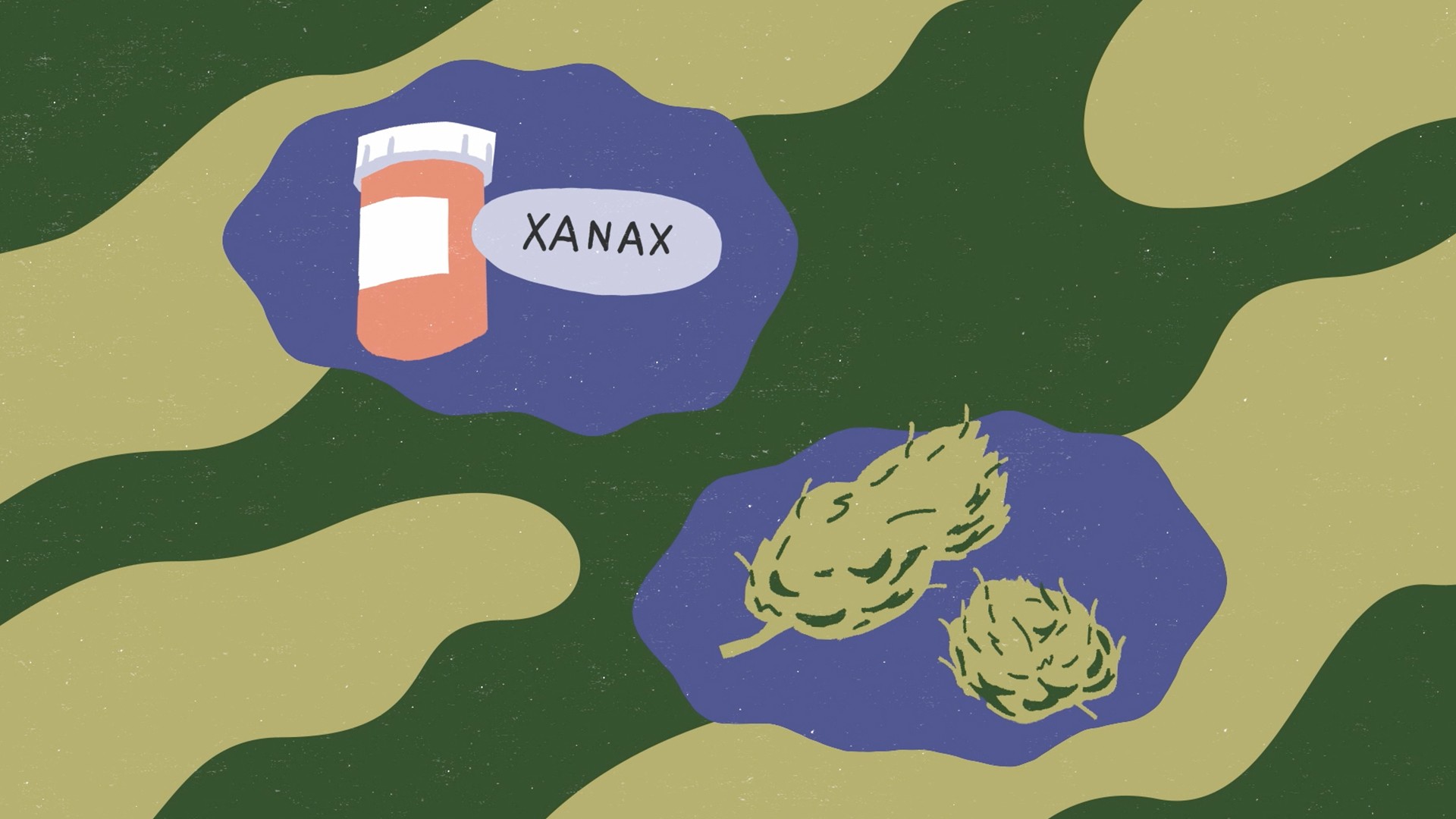Sharon McCutcheon/Unsplash
“I felt like someone turned on a light switch in my head,” Joseph Lazarus says of his first time smoking weed. It was a classic scene from American adolescence: He snuck out into woods near his home in York, Pennsylvania, with an older schoolmate who liked to blaze. For Lazarus, the experience was profound: “I heard the birds chirping for [what seemed like] the first time,” he says. The leaves seemed greener. He felt the wind tickle his skin. “I was one with the forest, a wooded forest. I was so calm.” He was 13.It was one of the first times Lazarus felt normal. At age six, he was diagnosed with attention-deficit/hyperactivity disorder and prescribed the usual stimulants. They didn’t help. “I couldn’t concentrate or retain information,” he says. “I had a hard time with grammar. I couldn’t remember the rules.” He was restless, unable to focus in class and easily bored at home for his entire childhood. He says emotional trauma played a role; he had to process his parents’ divorce at about the same age he was diagnosed. “I felt like there was a stick of dynamite in me ready to go off,” he says.But his thought pattern after smoking up? “It was like if you are on a four-lane highway with cars coming from everywhere and then you are on a country road.” Lazarus, now a 33-year-old home remodeler and still living in York, has been self-medicating with cannabis since that day in the woods. At the time, the dramatic change in his mannerisms caused a guidance counselor to start a process that got him sent to an institution for troubled teens. But he says weed has been the only treatment that has stabilized him. (Vaping is his current method of choice.) “I’m using a tape measurer and making calculations and plans every day,” he says. “I don’t think that would be possible without cannabis.”Evidence that cannabis helps with ADHD is emerging and scant, but signs indicate that people are using it to treat their symptoms, anyway. A 2016 Duke University study of 268 ADHD-related internet threads, for instance, found that 25 percent included a post from someone indicating that it was therapeutic for ADHD. (Only eight percent of the threads included a post saying it was harmful, five percent that it was a mix of therapeutic and harmful, and two percent that it had no effect on ADHD symptoms.)
More from VICE:
Other studies also show promise for cannabis-based medicine, if not recreational weed. Last year, researchers at King׳s College London’s Institute of Psychiatry, Psychology and Neuroscience completed a randomized, placebo-controlled experimental study of a cannabinoid medication on adults with ADHD. Subjects who used Sativex Oromucosal Spray—which is an extract of cannabis, and therefore different from recreational weed—experienced some relief in their hyperactivity/impulsivity symptoms. They also reported more inhibition and better attention depth when compared to the group that took a placebo.Ruth Cooper, the lead author who completed the study as part of her dissertation, says she was motivated by the knowledge that many psychiatrists and psychologists—including her advisor and co-author—recommend cannabis for ADHD. They prefer cannabis to medications often because of the more tolerable side effects, Cooper says. “There’s some research on it, but not very much,” she adds.Cooper says her study of 30 subjects is small, but promising. “I think in the future if more evidence could be shown that it has greater effects in larger trials, it would become a common treatment,” she says. In the meantime, some physicians aren't waiting for more scientific input. David Bearman, a private practice physician and certified cannabinoid medicine specialist, has been prescribing medical marijuana in California for 40 years, he says, and working around the laws in place. Bearman says young people and parents often contact him about cannabis-based treatments for ADHD. They complain that drugs like Ritalin increase the restlessness and nervousness that was problematic in the first place.
Advertisement
Advertisement
More from VICE:

Other studies also show promise for cannabis-based medicine, if not recreational weed. Last year, researchers at King׳s College London’s Institute of Psychiatry, Psychology and Neuroscience completed a randomized, placebo-controlled experimental study of a cannabinoid medication on adults with ADHD. Subjects who used Sativex Oromucosal Spray—which is an extract of cannabis, and therefore different from recreational weed—experienced some relief in their hyperactivity/impulsivity symptoms. They also reported more inhibition and better attention depth when compared to the group that took a placebo.Ruth Cooper, the lead author who completed the study as part of her dissertation, says she was motivated by the knowledge that many psychiatrists and psychologists—including her advisor and co-author—recommend cannabis for ADHD. They prefer cannabis to medications often because of the more tolerable side effects, Cooper says. “There’s some research on it, but not very much,” she adds.Cooper says her study of 30 subjects is small, but promising. “I think in the future if more evidence could be shown that it has greater effects in larger trials, it would become a common treatment,” she says. In the meantime, some physicians aren't waiting for more scientific input. David Bearman, a private practice physician and certified cannabinoid medicine specialist, has been prescribing medical marijuana in California for 40 years, he says, and working around the laws in place. Bearman says young people and parents often contact him about cannabis-based treatments for ADHD. They complain that drugs like Ritalin increase the restlessness and nervousness that was problematic in the first place.
Advertisement
The effect on students with ADHD who are struggling, he says, tends to be dramatic. “Most of my patients' [grades] went from Cs and Ds to Bs,” Bearman says. “One credited cannabis with getting his PhD.” Bearman posits—as many other researchers have—that ADHD might be the result of a lack of the neurotransmitter dopamine in the brain’s prefrontal cortex. Nerve signals might be slowed or stagnated, leading to a loss of attention and generally slower thought process. THC causes the brain to produce more dopamine, which means more of it becomes available for the essential tasks of memory and attention.Celeste Thirlwell, a physician and sleep specialist at Apollo Cannabis Clinics in Toronto, says that the inflammation of the nervous system is a common cause of ADHD, and cannabis is a natural anti-inflammatory agent. Without deep sleep, “the nervous system is not being properly entrenched,” Thirlwell says. "It's not being turned off properly, so you have problems with memory.”Thirwell recommends her patients vape with a sativa strain to ease the inflammation and get an attention-renewing night of sleep. Not all medical professionals, however, are quite so bullish on using cannabis to treat attention deficit disorder: “ADHD is a basket of problems,” says Scott Shannon, a physician and holistic medical practitioner in Fort Collins, Colorado. "Saying you can’t pay attention is like saying [to a mechanic], ‘My car isn’t going forward.’ There are many things that could [be] wrong.”Shannon, however, has recommended hemp-derived CBD, the non-psychoactive compound in the cannabis plant, for ADHD symptoms and other complaints related to restlessness in his patients. (He would prefer to avoid the psychoactive effects of THC.) But he cautions people not to overthink the effect. “We know that engaging the endocannabinoid system has a calming effect,” he says, “so naturally, CBD is useful for that over-arousal."Sign up here to get advice and true stories about mental health in your inbox every week.
